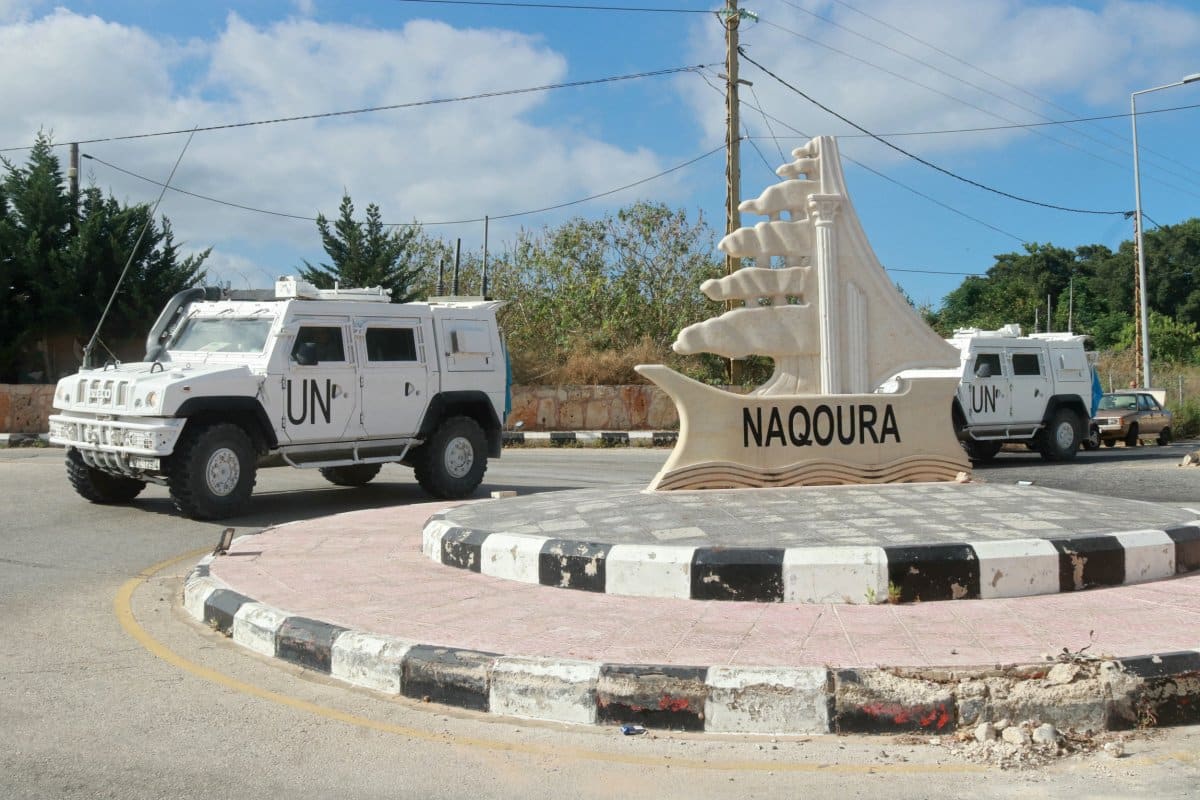Israeli strikes hit the United Nations (U.N.) peacekeepers’ base in southern Lebanon on Thursday and Friday—which has injured at least four peacekeepers—has drawn widespread condemnation and outrage from global leaders.
Friday’s strikes in Naqoura injured two U.N. Interim Force in Lebanon (UNIFIL) peacekeepers, “after two explosions occurred close to an observation tower,” the peacekeeping group wrote in a statement posted on Telegram Friday morning. Both injured peacekeepers were hospitalized.
The news comes the day after UNIFIL reported that two peacekeepers were injured after an Israel Defense Forces (IDF) tank fired at the observation tower “directly hitting it and causing them to fall.” The peacekeepers were then hospitalized.
IDF soldiers also hit “the entrance to the bunker where peacekeepers were sheltering, and damaging vehicles and a communications system,” UNIFIL said in a statement Thursday.
The U.N. group also reported that on Friday “an IDF caterpillar hit the perimeter and IDF tanks moved in the proximity of the UN position.”
The IDF said in a Friday statement that its soldiers “identified an immediate threat against them. The soldiers responded with fire toward the threat. An initial examination indicates that during the incident, a hit was identified on a @UNIFIL_post, located approximately 50 meters from the source of the threat, resulting in the injury of two UNIFIL personnel.”
“Peacekeepers were inadvertently hurt during IDF combat against Hezbollah in southern Lebanon,” IDF spokesperson Nadav Shoshani wrote on X, formerly Twitter. “The IDF expresses deep concern over incidents of this kind and is currently conducting a thorough review at the highest levels of command to determine the details.”
There are around 10,000 peacekeepers in southern Lebanon, with members from about 50 countries, who patrol, monitor and report violations of U.N. protocols, as well as support local communities.
On Friday, U.N. Secretary General António Guterres called the strikes and wounding of peacekeepers “obviously condemnable.”
In a Telegram post on Friday, the UNIFIL wrote that “any deliberate attack on peacekeepers is a grave violation of international humanitarian law and Security Council resolution 1701 (2006).”
In a post on Saturday, UNIFIL reported that a fifth peacekeeper was injured after being “hit by gunfire.” The member underwent surgery and is in stable condition. The group said it does “not yet know the origin of the fire.”
Newsweek has reached out to the IDF and UNIFIL for comment via email on Saturday.

UNIFIL (United Nations Interim Force in Lebanon) armored vehicles are seen in Naqoura, Lebanon, near the border with Israel on June 17. Israeli strikes hit the United Nations peacekeepers’ base in southern Lebanon on Thursday and Friday—which has injured at least four peacekeepers—has drawn widespread condemnation and outrage from global leaders.
MAHMOUD ZAYYAT/AFP via Getty Images
Global leaders have expressed outrage and concern over Israel’s military actions against the peacekeeping unit. Deliberate attacks on peacekeepers are considered war crimes under the Geneva Convention, U.N. Security Council resolutions, and the Rome Statute.
Irish Prime Minister Simon Harris described the situation as “really dangerous, despicable attacks on peacekeepers” and that “international law has to be followed, and proportionality also has to be due” in an interview with BBC News. Ireland has troops as a part of the UNIFIL mission.
A United Kingdom government spokesperson told reporters it is “appalled” by the Israeli strikes that injured UNIFIL peacekeepers, while France, Italy, and Spain all condemned the strikes in a joint statement, calling them “unjustifiable.”
“We condemn it, we do not tolerate it and we do not tolerate it happening again,” French President Emmanuel Macron said. At a news conference on Thursday, Italy’s Defense Minister Guido Crosetto said Israel’s strikes were “not a mistake and not an accident.”
Russia’s foreign ministry said in a statement that “Moscow is outraged by the actions of the Israeli military,” while China expressed “grave concern and strong condemnation” of Israel’s actions on UNIFIL.
India’s Ministry of External Affairs wrote in a statement Thursday that “inviolability of UN premises must be respected by all, and appropriate measures taken to ensure the safety of UN peacekeepers and the sanctity of their mandate.”
The injury of UNIFIL peacekeepers from Israeli fire come three weeks after Israel launched a ground invasion of Lebanon, targeting the country in an effort to eliminate Hezbollah. However, the strikes have killed hundreds of civilians, including children and medical workers. The Associated Press estimates that more than 1,400 people have been killed in Lebanon from Israeli operations over the past three weeks, with over a million displaced.
Israel’s northern push into Lebanon and the killing of longtime Hezbollah leader Hassan Nasrallah have raised fears of an all-out war, with military actions escalating across the region, including an Iranian missile strike against Israel in retaliation earlier this month.
To its west, Israel continues to bomb Gaza in its ongoing campaign to eliminate Hamas in a war that has lasted more than a year, killing over 42,000 Palestinians. On Friday, deputy U.N. spokesperson Farhan Haq said, “Aid entering Gaza is at its lowest level in months. No one has received food parcels in this month due to constrained access of aid supplies.” He said the situation is at its “breaking point.”
On October 7, 2023, Hamas, a Palestinian militant group, attacked Israel, taking around 250 hostages and killing around 1,200 people. Since then, Israel has launched several ground and air invasions in Gaza.









